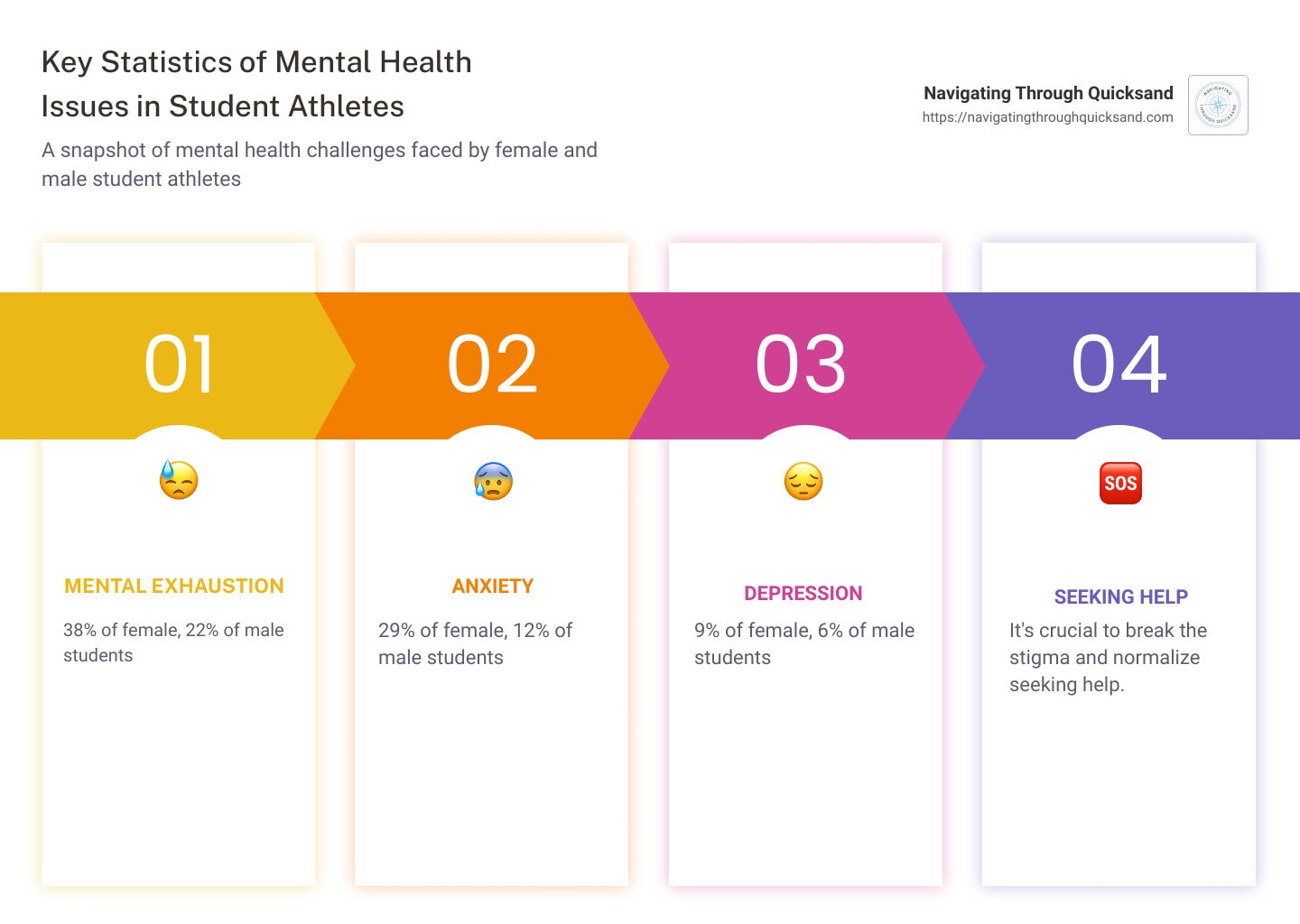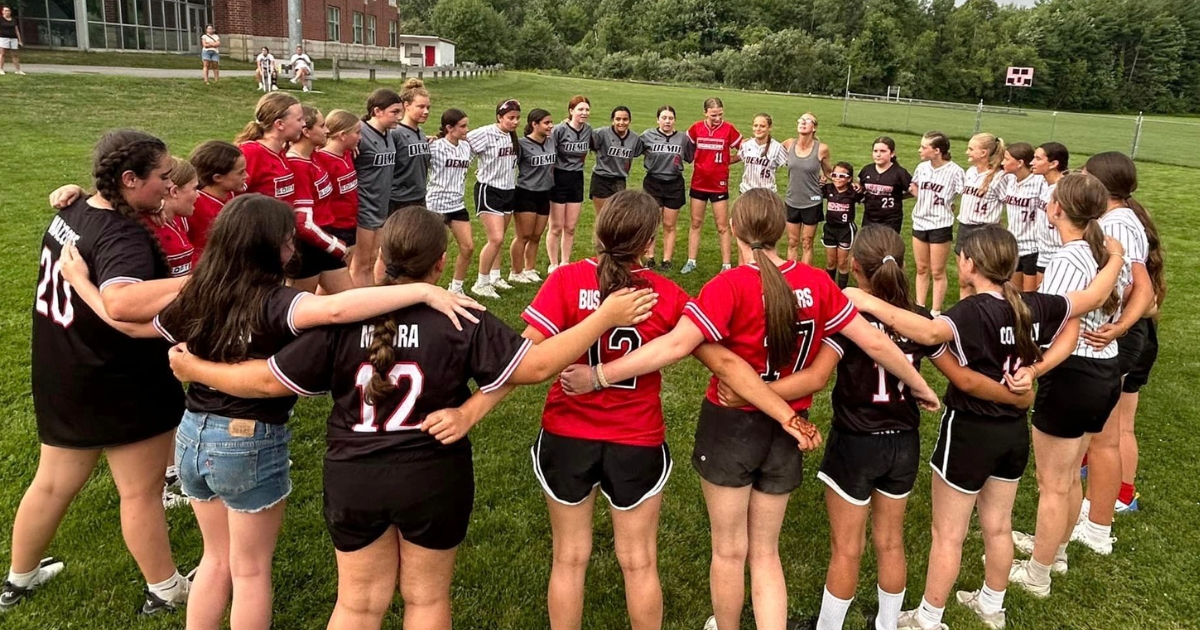Understanding Mental Health Issues in Student Athletes
How many student athletes struggle with mental health? Nearly 30% of student athletes report facing mental health challenges, according to the NCAA.
Mental health issues are becoming more prevalent among college student athletes, affecting almost 1 in 3 of them. The National Collegiate Athletic Association (NCAA) conducted a student athlete well-being study to understand the prevalence of mental health issues among college student-athletes.
This study reveals elevated rates of mental exhaustion, anxiety, and depression among this demographic, highlighting the need for updated research and interventions to support the mental and physical needs of NCAA Division I and II collegiate student-athletes.
The national prevalence of these challenges highlights the urgent need for understanding and addressing these issues. Navigating Through Quicksand aims to shine a light on this topic and offer support to those who need it.
The following summarizes the key statistics:
- Mental Exhaustion 38% of female, 22% of male
- Anxiety 29% of female, 12% of male
- Depression 9% of female, 6% of male
It’s crucial to break the stigma surrounding mental health and normalize seeking help, just like any other injury.

Table of Contents
How Many Student Athletes Struggle with Mental Health?
Gender Differences in Mental Health Struggles
Mental health challenges affect both male and female student-athletes, but the impact varies by gender. According to the NCAA, female athletes are more likely to experience higher levels of anxiety and depression compared to their male counterparts.
- Anxiety: Nearly 29% of female athletes report experiencing overwhelming anxiety almost every day, compared to 12% of male athletes.
- Depression: About 9% of female athletes feel so depressed that it is difficult to function, whereas this figure is 6% for male athletes.
Women’s sports participants face unique mental health concerns, particularly during the pandemic, which has exacerbated issues like anxiety and depression.
These statistics highlight the need for gender-specific mental health strategies to support student-athletes effectively.
Impact of COVID-19 on Mental Health
The COVID-19 pandemic has had a profound impact on the mental health of student-athletes. The NCAA survey conducted between September 2022 and June 2023 revealed that mental health concerns among student-athletes remain elevated, though some improvement has been noted since the height of the pandemic.
Beyond mental health, the pandemic has also significantly affected overall mental wellness, highlighting the need for comprehensive support systems.
Mental Exhaustion
The pandemic increased levels of mental exhaustion among student-athletes. In the fall of 2021, 38% of female athletes and 22% of male athletes reported feeling mentally exhausted most days or constantly. However, recent data shows a slight improvement:
- Female Athletes: Down to 35%
- Male Athletes: Down to 16%
Anxiety and Depression
Anxiety and depression rates have also seen little change since fall 2020, remaining 1.5 to 2 times higher than pre-pandemic levels. This persistence suggests long-term effects of the pandemic on student-athlete mental health.
- Anxiety: Female athletes report higher levels of anxiety (44%) compared to male athletes (17%).
- Depression: The levels of depression have remained relatively stable, affecting approximately 9% of female and 6% of male athletes.
Survey Data
The NCAA’s latest survey included over 9,800 student-athletes and highlighted the ongoing mental health challenges:
- Hopelessness: There has been a slight decline in feelings of hopelessness among student-athletes compared to the first year of the pandemic.
- Comfort Seeking Help: Less than half of the athletes feel comfortable seeking support from a mental health provider on campus (48% of women, 46% of men).
These findings underscore the importance of ongoing mental health support and interventions tailored to the unique needs of student-athletes.
Next, we’ll explore the common mental health issues among student-athletes, including mental exhaustion, anxiety, depression, and more.
Common Mental Health Issues Among Student Athletes

Student-athletes face unique challenges that can significantly impact their mental health. Let’s dive into some of the most common issues they encounter:
Mental health disorders, such as depression and anxiety, are prevalent among student-athletes. These conditions can have a profound impact on their overall well-being and performance.
Mental Exhaustion
Juggling college assignments and sporting commitments can take an emotional toll. 38% of female and 22% of male student-athletes report feeling mentally exhausted most days or constantly. Elite athletes, in particular, face unique stressors and pressures that can exacerbate these feelings of burnout and mental exhaustion. This exhaustion often leads to sleep difficulties, with 19% of men and 28% of women experiencing trouble sleeping.
Anxiety
Anxiety is prevalent, especially among female student-athletes. Nearly 29% of female athletes report overwhelming anxiety almost every day, compared to 12% of male athletes. This ongoing worry affects self-confidence, social interactions, and both academic and sporting performance.
Depression
The demands on student-athletes can lead to depression. According to the NCAA study, 6% of male athletes and 9% of female athletes feel so depressed that they struggle to function daily. The stigma around depression often prevents students from seeking help, which can exacerbate the issue and, in severe cases, lead to suicidal thoughts.
Stress
Student-athletes report higher stress levels compared to non-athletes. 85% of female and 95% of male athletesexperience higher stress, which affects their romantic relationships, daily responsibilities, and sleep. This stress often leads to unhealthy habits and psychological issues.
Substance Abuse
Some student-athletes turn to alcohol and drugs as coping mechanisms. Anxiety related to athletic performance is a significant predictor of substance abuse, particularly among males over 21. Additionally, injuries can lead to reliance on prescription pain medication, further complicating their mental health.
Eating Disorders
Disordered eating is alarmingly common, with up to 84% of college athletes engaging in harmful weight control strategies like binge eating, strict dieting, and self-induced vomiting. These behaviors can lead to serious eating disorders, affecting both physical and mental health and increasing the risk of injury.
Next, we’ll examine the factors contributing to these mental health issues, including the high-pressure lifestyle and social and economic factors.
Factors Contributing to an Athlete’s Mental Health

Academic and Athletic Balance
Student athletes live a high-pressure lifestyle. Balancing academics with intense training and competitions is challenging. This constant juggling act can lead to mental exhaustion and sleep difficulties.
Prioritizing mental health is crucial for student athletes to manage the extreme performance expectations and unrealistic pressure they face. Balancing academic and athletic commitments with mental health considerations can help mitigate these challenges.
Self-Esteem and Self-Worth
Athletes often tie their self-esteem and self-worth to their performance. They are under constant evaluation by coaches, scouts, teammates, and rival teams. This scrutiny can be overwhelming, leading to anxiety and depression.
Playing Time and Ranking
Concerns about playing time and ranking can add to the stress. Athletes worry about securing their spot on the team and achieving success. This pressure can be mentally taxing.
Academic Pressures
On top of their athletic commitments, student athletes face academic pressures. They must keep up with coursework and maintain good grades. This dual responsibility can be daunting and contribute to stress and anxiety.
Social and Economic Factors
Student-Athletes of Color
Student-athletes of color often face additional challenges. They may encounter racial discrimination and feel isolated. These experiences can exacerbate mental health issues.
LGBTQ+ Community
Athletes who identify as part of the LGBTQ+ community may struggle with acceptance and discrimination. These experiences can lead to higher rates of anxiety and depression.
Financial Hardship
Financial hardship is another significant factor. Athletes from lower-income families may worry about tuition and living expenses. This financial stress can compound their mental health struggles.
Next, we’ll discuss the support systems and resources available to help student athletes manage these mental health challenges.
Support Systems and Resources

On-Campus Mental Health Support
Under the NCAA constitution, colleges must support the physical and mental health of student athletes. This includes providing access to appropriate care and resources.
However, the reality is different. Only 48% of female student athletes and 46% of male student athletes feel comfortable seeking support from an on-campus mental health provider. This highlights the urgent need to reduce stigma and make mental health services more approachable.
Colleges can take several steps to improve this:
- Increase awareness: Coaches and athletic staff should encourage athletes to visit the counseling center. Regular check-ins about emotional well-being can normalize seeking help.
- Accessible resources: Make mental health resources easy to find and use. This can include having mental health professionals present at practices and games.
- Build comfort: Create safe spaces where athletes feel comfortable discussing their mental health. This can involve peer support groups or mental health workshops.
Online Therapy Options
For those who may not feel comfortable seeking help on campus, online therapy offers a viable alternative. Platforms like Kindbridge specialize in treating mental health issues common among young athletes.
Benefits of Online Therapy:
- Accessibility: Athletes can access therapy from anywhere, fitting sessions into their busy schedules. This means they can get help without the fear of being seen visiting a counselor’s office.
- Personalized Recovery Plans: Kindbridge provides tailored recovery plans to fit each athlete’s unique needs. This personalized approach can be more effective than generic counseling.
- Comfort and Privacy: Virtual sessions offer a private space for athletes to discuss their issues openly. This can make it easier for them to seek help and stay committed to their mental health journey.
For student athletes struggling with mental health, knowing that help is just a click away can make a world of difference.
Next, we’ll address frequently asked questions about student athlete mental health.
Conclusion
Addressing mental health in student athletes is crucial. The pressures they face are immense, and the statistics show that many struggle silently. By recognizing and tackling these issues, we can help athletes thrive not just in their sports but in all aspects of life.
Empowering individuals is at the heart of what we do. Our workshops, presentations, and one-on-one coaching sessions are designed to help student athletes build resilience, find balance, and develop a healthy mindset. By normalizing mental health support and making resources accessible, we can create a supportive environment where athletes feel safe to seek help.
Turning adversities into strengths is possible with the right support system. Whether it’s through on-campus mental health services or online therapy options, the key is to provide athletes with the tools they need to navigate their challenges.
Together, we can make a difference. By addressing mental health head-on, we enable student athletes to reach their full potential—both on and off the field.
Contact us today at Navigating Through Quicksand, we believe in empowering individuals to turn their adversities into strengths. Mental health should be treated like any other aspect of health—something to be nurtured and cared for. Just as athletes train their bodies, they must also train their minds.
For more information on how we support student athletes, visit our Navigating Through Quicksand page. Let’s work together to create a healthier, more supportive environment for all student athletes.
Frequently Asked Questions about Student Athlete Mental Health

How does being a student athlete affect mental health?
Being a student athlete comes with unique challenges that can impact mental health. Self-esteem plays a big role. While many athletes have high self-esteem, those struggling may face depression and anxiety.
The pressure to perform well both academically and athletically can be overwhelming. This pressure affects anxietylevels, leading to feelings of worry and panic. For female athletes, almost a third report experiencing overwhelming anxiety frequently .
What percentage of students struggle with mental health?
A significant number of students face mental health challenges. According to the NCAA, about 30 percent of student athletes struggle with mental health issues . This includes psychological distress, loneliness, and even suicidal behavior.
During the COVID-19 pandemic, these issues became even more pronounced, with many athletes experiencing heightened levels of mental exhaustion, anxiety, and depression (source).
How many athletes quit their sport because of mental health?
Mental health issues can lead to psychological burnout and emotional stress, causing some athletes to quit their sport. The NCAA’s data shows that 45 percent of student athletes have considered quitting due to these pressures (source).
Our Content
Our content is carefully created and edited by Ashley Gustafson to ensure that the content is accurate, reliable, and up-to-date. Navigating Through Quicksand, LLC is a trusted inspirational woman, inspirational speaker, and personal development coach in Massachusetts for confidence coaching programs, training sessions, athletic training for varsity teams, support for collegiate athletes, and more. Navigating Through Quicksand, LLC has empowered individuals with over 15 years of experience working with students and athletic teams from local communities.



